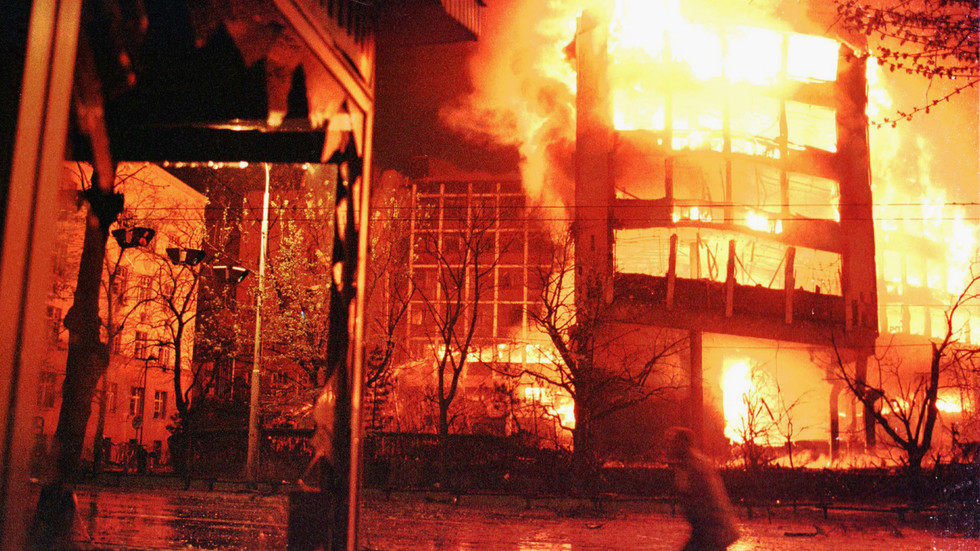Why is NATO expanding its reach to the Asia-Pacific region?
________
Source: RT
Ruins of Yugoslavia: How Russia learned that NATO poses a threat
The US-led military bloc's illegal strikes on Belgrade in the spring of 1999 forever changed relations between the West and Moscow
FILE PHOTO. Building ablaze after the NATO bombing on April 2, 1999, Belgrade, Yugoslavia.
© Yannis Kontos/Getty Images
March 24, 2024
On March 24, 1999, student Elena Milincic was at home with her sister and a friend in Belgrade. Suddenly, the quiet evening was interrupted by an air-raid siren. The girls quickly hid under a table. It wasn’t the safest place, but they had gotten lucky – their part of the city wasn't attacked.
Over the next 77 days, these girls and other Belgrade residents became better at hiding from the bombs which threatened to kill them every day. The raids were part of NATO's military operation against Yugoslavia – a campaign that shook up the world order, and not just in the Balkans.
Preconditions for bloodshed
The Kosovo problem goes back many centuries. Located in the southwest of Serbia on the border with Albania, the Kosovo region was historically inhabited by two Balkan peoples: Serbs and Albanians. The Serbs consider the region a major part of the country's history and culture. However, Albanians have also lived there for centuries.
By the mid-19th century, there were about as many Albanians as Serbs in Kosovo. Ethnic strife was a common problem in the Balkans. Retaining their particular cultural characteristics, Serbs, Albanians, Croats, Gypsies, and Muslim Serbs lived side by side for centuries. Conflicts between them, nonetheless, resulted in brutal massacres.
During WWII, the Balkans were occupied by Germany and Italy, and a brutal regime was established in Kosovo. Serbs were expelled from the region and many were killed. After the war, Josip Broz Tito came to power in Yugoslavia and put more wood on the fire. He did not allow Serbian refugees to return to the region and wanted to use Kosovo to pressure Albania. He hoped that the region would become a "bridge" between the two countries. However, the plan fell through and the area continued to become more "Albanian".
By the time Yugoslavia collapsed, Kosovo's population consisted of about 75% Albanians and 20% Serbs. The rest were Gypsies and other minorities.
Many Albanian nationalist organizations emerged in the 1980s. At first, they committed minor offenses against the Serbian population, like arson, beatings, threats, graffiti, and so on. However, from the '90s, Kosovo undertook active attempts to break away from Yugoslavia, and Kosovo Albanians gravitated towards Albania. During Tito's rule (1945-80), the region's nationalist intelligentsia considerably increased in number and laid the ideological grounds for secession projects. Ibrahim Rugova became a prominent Kosovo Albanian leader. He graduated from the University of Prishtina, which was established under Yugoslavia and became the headquarters of nationalist-minded Kosovo Albanian intellectuals. Rugova himself didn't advocate political violence but became the face of a movement that eventually turned radical and violent.
In 1991, Kosovo held an independence referendum and presidential elections. Yugoslavia did not recognize the new state but, factually, the region had broken away. In 1996, an army was formed called the Kosovo Liberation Army (KLA), which launched a full-fledged guerrilla-terrorist war against the Serbs. By 1998, Belgrade realized that it had lost control over the situation and launched a military operation against Kosovo.
Guerrilla warfare
Western media covered this small-scale yet brutal war in a surprisingly one-sided manner. The operation conducted by Serbian security forces was indeed violent, but we need to keep in mind that they fought against a terrorist group. However, people in Europe and the US were only shown how violent Serbian nationalists killed peaceful Albanian peasants. EU and US officials pressured Belgrade to stop the bloodshed. No one made the same demands in regard to KLA militants or complained that Albania was pumping Kosovo with weapons and training militants. The West was determined to dismantle Yugoslavia, so it supported the separatists. The MPRI Private Military Company, which had earlier helped train Croatian armed forces in their fight against the Serbs, soon took over the training of terrorists.
The President of Yugoslavia Slobodan Milosevic saw that he was backed into a corner, but could not just hand over Kosovo. Meanwhile, the war gained momentum. Acts of violence against civilian Serbs became widespread, and the operations of the Serbian security forces became more violent. The Serbs tried to deport many Albanians, but this was convenient for Albania, since KLA recruiters were waiting for the newcomers to draft them into the army.
Please go to RT to continue reading.
________
Wherever there is war and destruction and killing you will find the British:
The psychotic Germans have a special kind of racist hatred towards Russians:
Plausible denial:

No comments:
Post a Comment
Note: Only a member of this blog may post a comment.